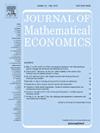A partial-state space model of unawareness
IF 0.7
4区 经济学
Q3 ECONOMICS
引用次数: 0
Abstract
We propose a model of unawareness that remains close to the paradigm of Aumann’s (1999a) model for knowledge: just as Aumann uses a correspondence on a state space to define an agent’s knowledge operator on events, we use a correspondence on a state space to define an agent’s awareness operator on events. This is made possible by three ideas. First, like the model of Heifetz, Meier, and Schipper (2006), ours is based on a space of partial specifications of the world, partially ordered by a relation of further specification or refinement, and the idea that agents may be aware of some coarser-grained specifications while unaware of some finer-grained specifications; however, our model is based on a different implementation of this idea, related to forcing in set theory. Second, we depart from a tradition in the literature, initiated by Modica and Rustichini (1994) and adopted by Heifetz et al. and Li (2009), of taking awareness to be definable in terms of knowledge. Third, we show that the negative conclusion of a well-known impossibility theorem concerning unawareness due to Dekel, Lipman, and Rustichini (1998) can be escaped by a slight weakening of a key axiom. Together these points demonstrate that a correspondence on a partial-state space is sufficient to model unawareness of events. Indeed, we prove a representation theorem showing that any abstract Boolean algebra equipped with awareness, knowledge, and belief operators satisfying some plausible axioms is representable as the algebra of events arising from a partial-state space with awareness, knowledge, and belief correspondences.
无意识的部分状态空间模型
我们提出了一个与Aumann (1999a)知识模型的范式保持接近的无意识模型:正如Aumann使用状态空间上的对应关系来定义代理在事件上的知识算子一样,我们使用状态空间上的对应关系来定义代理在事件上的意识算子。这是由三个想法促成的。首先,像hefetz, Meier和Schipper(2006)的模型一样,我们的模型基于世界的部分规范空间,部分由进一步规范或细化的关系排序,并且agent可能意识到一些粗粒度的规范,而不知道一些细粒度的规范;然而,我们的模型是基于这个想法的不同实现,与集合理论中的强迫有关。其次,我们背离了由Modica和Rustichini(1994)发起并被hefetz et al.和Li(2009)采用的文献传统,即认为意识可以从知识的角度来定义。第三,我们证明了Dekel, Lipman和Rustichini(1998)提出的关于无意识的一个著名的不可能定理的否定结论可以通过稍微削弱一个关键公理来逃避。这些点共同证明了部分状态空间上的对应足以模拟事件的无意识。事实上,我们证明了一个表示定理,表明任何具有满足某些似是而非公理的意识、知识和信念算子的抽象布尔代数都可以表示为具有意识、知识和信念对应的部分状态空间中产生的事件的代数。
本文章由计算机程序翻译,如有差异,请以英文原文为准。
求助全文
约1分钟内获得全文
求助全文
来源期刊

Journal of Mathematical Economics
管理科学-数学跨学科应用
CiteScore
1.70
自引率
7.70%
发文量
73
审稿时长
12.5 weeks
期刊介绍:
The primary objective of the Journal is to provide a forum for work in economic theory which expresses economic ideas using formal mathematical reasoning. For work to add to this primary objective, it is not sufficient that the mathematical reasoning be new and correct. The work must have real economic content. The economic ideas must be interesting and important. These ideas may pertain to any field of economics or any school of economic thought.
 求助内容:
求助内容: 应助结果提醒方式:
应助结果提醒方式:


